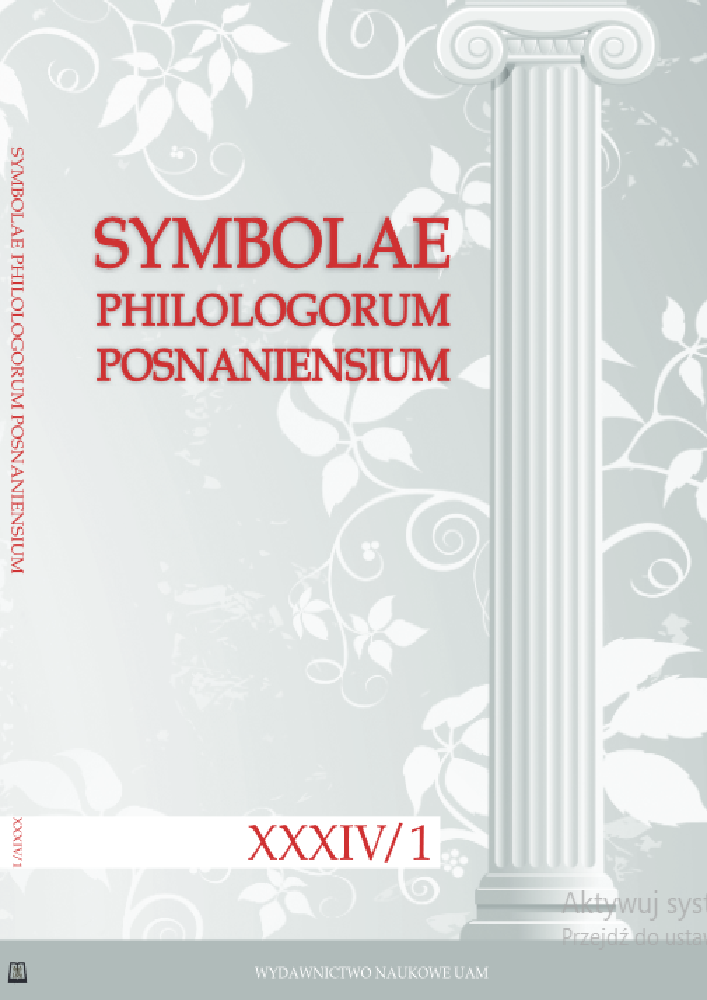Abstract
The purpose of this article is to reexamine the interpretation of comics 363–6 in Marvel’s The Mighty Thor series as a retelling of the Hellenistic mock epic poem Batrachomyomachia, a view expressed by scholars such as Nicholas Newman in his paper entitled The War of Frogs and Rats. The Batrachomyomachia in Marvel’s The Mighty Thor. The article proposes an alternative approach to reading these comics outside of the antique context, interpreting the similarities between the two works through the lens of cultural universals theory.
Literaturhinweise
Barcz 2017: Barcz, Anna. Animal Narratives and Culture: Vulnerable Realism. Cambridge: Cambridge Scholars Publishing, 2017.
Barthes 1977: Barthes, Roland. Image, Music, Text. Translated by Stephen Heath. London: Fontana Press, 1977.
Brown 1991: Brown, Donald. Human Universals. Philadelphia: Temple University Press, 1991.
Bauer 2020: Bauer, Martin. “Parody as a Sign of Generic Consciousness: Battle Descriptions in the Pseudo-Homeric Batrachomyomachia.” In Battle Descriptions as Literary Texts. A Comparative Approach, edited by Johanna Luggin and Sebastian Fink, 143–156. Wiesbaden: Springer VS, 143–156. DOI: https://doi.org/10.1007/978-3-658-27859-5_8
Brunnet-Traut 1954: Brunner-Traut, Emma. “Der Katzenmäusekrieg im Alten und Neuen Orient,” Zeitschrift der Deutschen Morgenländischen Gesellschaft 104, no. 2 (1954): 347–51.
Campbell 2004: Campbell, John. The Hero with a Thousand Faces. Princeton: Princeton University Press, 2004.
Christensen and Robinson 2018: Christensen, Joel, and Erik Robinson. The Homeric Battle of the Frogs and Mice: London–New York: Bloomsbury Academic, 2018. DOI: https://doi.org/10.5040/9781350035997
Ciolfi 2015: Ciolfi, Lorenzo Maria. “Κληρονόμος τοῦ αἰωνίου πυρὸς μετὰ τοῦ Σατανᾶ? La fortune de Lucien entre sources littéraires et tradition manuscrite,” Porphyra 24 no. 1 (2015): 39–54.
Errecalde 2020: Errecalde, Alejandro Martín. “Releyendo a Homero: tradición e innovación en el tratamiento de la figura heroica en la Batracomiomaquia,” In 8º Coloquio Internacional del Centro de Estudios Helénicos: Cartografías del yo en el mundo antiguo. Estrategias de su textualización. Accessed April 30, 2023 from http://coloquiointernacionalceh.fahce.unlp.edu.ar/8ciceh/actas/ponencia-220823143142287505/@@display-file/file/A14.pdf
Fish 1970: Fish, Stanley. “Literature in the Reader: Affective Stylistics,” New Literary History 2 no. 1 (1970): 123–62. DOI: https://doi.org/10.2307/468593
Fonseca 2010: Fonseca, Rui. “A cross-reading of Odysseus’ journey in The Battle of the Frogs and Mice: Psicharpax’s anti-odyssean portrait,” Graeco-Latina Brunensia 15 no. 2 (2010): 43–50.
Fusillo 1988: Fusillo, Massimo. La battaglia delle rane e dei topi. Milano: Guerini e associati, 1998.
Harmony and Blaylock 2022: Harmony, Damian, and Ed Blaylock. A Geek History of Time. Accessed April 30, 2023 from https://www.iheart.com/podcast/256-a-geek-history-oftime-43079235/episode/episode-155-batrachomyomachia-and-thors-95964678/.
Hosty 2014: Hosty, Matthew. “The Mice of Ithaca: Homeric Models in Batrachomyomachia,” Mnemosyne 67 no. 6 (2014):1008–13. DOI: https://doi.org/10.1163/1568525X-12301475
Hosty 2020: Hosty, Matthew. Batrachomyomachia (Battle of the Frogs and Mice): introduction, text, translation, and commentary. Oxford: Oxford University Press, 2020.
Idema 2019: Idema, Wilt. Mouse vs. Cat in Chinese Literature: Tales and Commentary. Seattle: University of Washington Press, 2019.
Keaney 1979: Keaney, John. “Moschopoulos and the Scholia to the Batrachomyomachia,” Classical Philology 74 no. 1 (1979): 60–3. DOI: https://doi.org/10.1086/366472
Kelly 2009: Kelly, Adrian. “Parodic inconsistency: some problems in the Batrakhomyomakhia,” The Journal of Hellenic Studies 129 no. 1 (2009): 45–51. DOI: https://doi.org/10.1017/S0075426900002950
Kelly 2014: Kelly, Adrian. “Hellenistic arming in the Batrachomyomachia,” The Classical Quarterly 64 no. 1 (2014): 410–13. DOI: https://doi.org/10.1017/S0009838813000840
Ludwich 1896: Ludwich, Artur. 1896. Die homerische Batrachomachia des Kares Pigres nebst Scholien und Paraphrase. Leipzig: Teubner, 1896.
Lycius 1566: Lycius, Leonhart. Batrachomyomachia, Homeri poema festivum et elegans de ranarum cum muribvs pugna […]. Lipsiae: Ernst Vögelin, 1566.
Marciniak and Warcaba 2018: Marciniak, Przemysław, and Katarzyna Warcaba. “Theodore Prodromos Katomyomachia as a Byzantine Version of Mock-Epic,” In Middle and Late Byzantine Poetry: Texts and Contexts, edited by Andreas Rhoby and Nikolaos Zagklas, 97–110. Turnhout: Brepols Publishers, 2018. DOI: https://doi.org/10.1484/M.SBHC-EB.5.115585
Most 1993: Most, Glenn. “Die Batrachomyomachie als ernste Parodie,”, Im Literaturparodie in Antike und Mittelalter, edited by Wolfram Ax and Reinhold. Glei, 27–40. Trier: Wissenschaftlicher Verlag Trier, 1993.
Newman 2020: Newman, Nicholas. “The War of the Frogs and the Rats. The Batrachomyomachia in Marvel’s The Mighty Thor,” New Voices in Classical Reception Studies 13 no. 1 (2020): 78–94.
Osius 1566: Osius, Hieronymus. Pugna ranarum ac murium Homeri Latino carmine reddita et amplificata. Ratisponae: Henricus Gesler, 1566.
Otto 1564: Otto, Joachim. Batrachomyomachia Homeri Latino carmine reddita. Rostock: Stefana Mölleman, 1564.
Sever Serezli 2023: Serezli, Esra Sever. “Children’s Literature: Exploring Intertextual Relationships,” Children’s Literature in Education 1 (2023): 1–17.
Stokes and Allie 2017: Stokes, Miles, and Elisabeth Allie. Episode 8: of Frogs and Men. Accessed April 30, 2023 from https://thelightningandthestorm.com/2017/06/episode-8-of-frogs-andmen/.
Stroh 2016: Stroh, Wilfried. “De fabvlis Latinis in vsvm pverorvm pvellarvmqve scriptis”, Rheinisches Museum für Philologie 159 no. 3–4 (2016): 225–289.
Teixidó 2015: Teixidó, Ramon. “Sobre la mixtura de géneros en la Batracomiomaquia,” In Ianua Classicorum. Temas y formas del Mundo Clásico. Actas del XIII Congreso Español de Estudios Clásicos, edited by Jesus de la Villa Polo, Patricia Cañizares Ferriz, Emma Falque Rey, José. Francisco González Castro, and Jaime Siles Ruiz, 287–94. Madrid: wydawnictwo, 2015.
Teixidó 2016: Teixidó, Ramon. “Aportaciones y notas sobre la difusión de la épica animalesca en manuscritos de la Batracomiomaquia hasta el s. XVI,” Lectura y signos 11 no. 1 (2016): 47–57. DOI: https://doi.org/10.18002/lys.v0i11.4752
Urquiza-Haas and Kotrschal 2015: Urquiza-Haas, Esmeralda, and Kurt Kotrschal. “The mind behind anthropomorphic thinking: attribution of mental states to other species,” Animal Behaviour 109 (2015): 167–76. DOI: https://doi.org/10.1016/j.anbehav.2015.08.011
West 2003: West, Martin. Homeric Hymns, Homeric Apocrypha, Lives of Homer, Cambridge, MA–London: Harvard University Press, 2003.
Zaggia 2013: Zaggia, Massimo. “Per una storia del genere zooepico fra Quattro e Cinquecento: testi e linee di sviluppo,” In L’eroicomico dall’Italia all’Europa, edited by Gabriele Bucchi. Pisa: Edizioni ETS, 2013.


